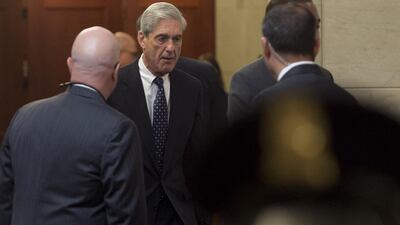Donald Trump may be in Davos but the inquiry into alleged Russian meddling in the 2016 US election is moving ever closer to the US president.
Having spoken to Mike Pompeo, the director of the CIA, and beleaguered justice secretary Jeff Sessions, special prosecutor Robert Mueller’s team now want to question Mr Trump himself.
Republicans and Democrats are stepping up partisan attacks on each other, federal investigators and intelligence services.
And a drip, drip, drip of information is adding to the cloud that has hung over the White House since questions emerged about who knew what about Russian efforts to sway the election.
The result is a febrile atmosphere in which Democrats believe the investigation is approaching uncharted territory while Republicans are stepping up attacks on the FBI to discredit the investigation into alleged collusion between Russia and the Trump campaign.
Noah Rothman, a conservative commentator, said on Twitter: “I've done two conservative radio shows today playing a generally adversarial role in defence of the FBI. The grassroots is eating up the notion Trump is a victim of systemic corruption in law enforcement.”
Conservative media outlets are focused on a secret dossier prepared by Republican congressmen, which reputedly details how security services attempted to undermine the Trump campaign. The four-page dossier is said to draw on classified documents but Democrats on the House Intelligence Committee, with security clearance to see the material, say the information is “cherry picked” and misleading.
The sniping comes as it emerged Mr Mueller was in talks with the White House to interview the president himself.
_______________
Read more:
Trump willing to be questioned under oath in Russia probe
US attorney general questioned by special counsel Russia investigation
Trump's former aide Bannon agrees to speak to Russia investigators
_______________
For his part, Mr Trump said he was ready to meet investigators under oath.
“I would love to do that — I’d like to do it as soon as possible,” he told reporters at the White House on Wednesday, adding that lawyers told him it would take place within the next three weeks.
Once again, he denied any wrongdoing.
“Here’s the story, just so you understand,” he said. “There’s been no collusion whatsoever. There’s no obstruction whatsoever, and I’m looking forward to it.”
The full scope of Mr Mueller’s investigation is unknown. His team of lawyers, forensic accountants and experts in white collar crime have conducted their work amid tight secrecy and minimal leaks.
But its recent interviews with Mr Trump’s inner circle have heightened speculation that its focus is now on the post-inauguration White House and, in particular, that the probe centres on the dismissal of James Comey as FBI director and discussions that preceded the removal of Michael Flynn, the White House national security adviser.
That period in the early days of the administration is central to allegations that Mr Trump tried to obstruct justice by deflecting Mr Comey from investigating Mr Flynn, before removing him altogether.
This week it emerged that Mr Sessions, who had urged the FBI director’s dismissal, was interviewed for hours, becoming the highest-ranking Trump administration official known to have submitted to questioning.
At the same time, the Associated Press reported that Mr Pompeo, along with Dan Coats, the director of national intelligence, and Admiral Mike Rogers, the National Security Agency director, were all quizzed last year on whether Mr Trump had asked them to lean on Mr Comey before he was fired last May.

